外研版九年级英语下册Module 6 模块知识点归纳
外研版初三下册英语module6知识点梳理:unit1

外研版初三下册英语module6知识点梳理:unit1I. 根据中文完成句子。
1. 运动会将在5月18日举行。
The sports meeting _________ __________________on May 18.2. 酸辣汤是玲玲在家里做的。
Suanlatang _________ _________by Lingling at home.3. 饺子是中国的传统食物。
Jiaozi is a _________ _________ from China.4. 世界上到处都有人吃比萨饼。
Pizza can _________ _________ everywhere all over the world.5. 要求每个人带些吃的东西。
Everyone will _________ _________ _________ bring something _________ _________.II. 把下列句子变成被动词态。
1. Do they teach Japanese in their school?___________________________________________________ ___2. We heard her sing in the room.___________________________________________________ ___3. Will they eat a special dinner at the restaurant?___________________________________________________ ___4. He hasn’t finished his homework yet.___________________________________________________ ___5. He gave me a very nice present for my birthday.___________________________________________________ ___6. Can we make jiaozi at school?______________________________________________________7. Must we finish the work now?___________________________________________________ ___8. Linda looks after the kid at home.___________________________________________________ ___9. He found nobody in.___________________________________________________ ___l0. They saw a lot of students playing basketball on the playground.___________________________________________________ ___有了上文梳理的初三下册英语module6知识点梳理,相信大家对考试充满了信心,同时预祝大家考试取得好成绩。
新外研版九下Module6 XXX知识点总结

新外研版九下Module6 XXX知识点总结M6 XXXUnit 11.XXX。
It is also possible to XXX to do something or to XXX.2.When will the school-leaver's party take place?3.The school-leaver's party will be held on May 30th。
(Please review the eight passive voice forms.)4.In fact。
I was selected to play the dance music。
Choose isa XXX." Its past tense is chose and its past participle is chosen。
Choose to do something means "to select to do something." The noun form of choose is choice。
which means "to make a n." It is usually used with the verb make。
We each had to make a choice。
nally。
choose can also be an adjective meaning "selected."5.XXX "to make ready." It is followed by a noun or pronounas its object。
Common phrases include "prepare someone something" or "prepare something for someone," meaning "tomake something for someone." Another common phrase is "prepare to do something," meaning "to get ready to do something." For example。
Module 6 知识点笔记 2022-202X学年外研版九年级英语下册
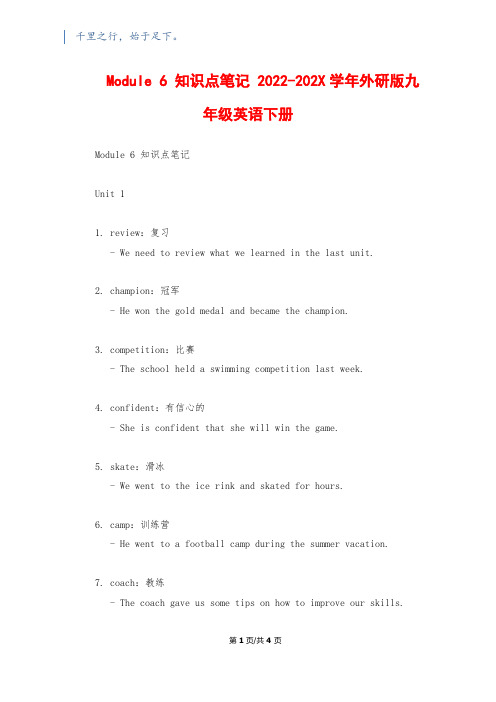
Module 6 知识点笔记 2022-202X学年外研版九年级英语下册Module 6 知识点笔记Unit 11. review:复习- We need to review what we learned in the last unit.2. champion:冠军- He won the gold medal and became the champion.3. competition:比赛- The school held a swimming competition last week.4. confident:有信心的- She is confident that she will win the game.5. skate:滑冰- We went to the ice rink and skated for hours.6. camp:训练营- He went to a football camp during the summer vacation.7. coach:教练- The coach gave us some tips on how to improve our skills.第1页/共4页8. teammate:队友- She enjoys playing basketball with her teammates.9. opportunity:机会- This competition is a great opportunity for us to show our talent.10. injury:受伤- He couldn't participate in the race because of his injury.Unit 21. performance:表演- The actors gave a brilliant performance on stage.2. audience:观众- The audience applauded loudly after the performance.3. stage:舞台- The actors walked onto the stage one by one.4. costume:戏服- The actors changed into their costumes backstage.5. script:剧本- The director handed out the scripts to the actors.6. rehearse:排练- The cast members need to rehearse every day for the play.7. dialogue:对话- The actors practiced their dialogues together.8. scene:场景- They were filming a scene in the park yesterday.9. lighting:灯光- The lighting in the theater was very beautiful.10. applause:鼓掌- The audience gave a round of applause at the end of the play.Unit 31. daily routine:日常生活- She has a fixed daily routine that she follows every day.2. tidy up:整理- I need to tidy up my room before my friends come over.3. grab:抓住- He grabbed his bag and ran out of the house.4. dishwashing:洗碗- I take turns with my sister in doing the dishwashing.5. lawn mowing:修剪草坪- My brother helps with the lawn mowing every weekend.第3页/共4页6. take out the rubbish:倒垃圾- It's my turn to take out the rubbish today.7. do the laundry:洗衣服- She does the laundry every Sunday.8. grocery shopping:买菜- My mom goes grocery shopping every week.9. iron clothes:熨衣服- My dad usually irons his clothes before going to work.10. mop the floor:拖地- I mop the floor every evening to keep it clean.。
外研版九年级下册M6知识点

外研版九年级下册M6知识点外研版九年级下册M6是我们中学生学习英语的一本重要教材,它涵盖了多个重要的知识点,帮助我们更好地学习和掌握英语。
在这篇文章中,我将从几个方面来探讨M6的知识点。
首先,M6的语法知识点是学习英语的基础。
在这个单元里,我们学习了被动语态的用法。
被动语态在英语中是非常重要的,它能够帮助我们更好地理解和表达被动的动作。
通过学习被动语态,我们能够更加灵活地运用英语,提高我们的口语表达能力。
同时,M6还教我们了一些常用的句型和短语,例如"be supposed to"和"prefer to"等。
这些句型和短语的学习能够帮助我们丰富我们的表达方式,提高我们的语言表达能力。
其次,M6还介绍了几个重要的话题,如环保和旅游。
我们学习了一些与环境保护有关的词汇和短语,例如"pollution"和"recycle"等。
这些词汇不仅可以帮助我们更好地理解文章的内容,还可以扩展我们的词汇量,提高我们的阅读能力。
旅游是另一个重要的话题,在M6中我们学习了一些旅游相关的词汇和句型,例如"tourist attractions"和"plan a trip"等。
通过学习这些词汇和句型,我们能够更好地进行旅行规划和沟通,增加我们的实际应用能力。
除了语法和话题,M6还涉及了一些重要的阅读技巧。
在这个单元中,我们学习了如何阅读和理解图表和图表。
这对我们提高阅读理解能力非常有益。
图表和图表是现实生活中经常出现的形式,例如数据报告和统计数据。
通过学习阅读这些图表和图表,我们能够更好地获取信息和分析数据,提高我们的综合运用能力。
此外,M6也涉及了一些写作技巧。
我们学习了如何写一封邀请信和一篇旅行日记。
这些写作技巧对我们来说非常重要,因为它们可以帮助我们更好地表达我们的想法和情感。
通过学习这些写作技巧,我们能够培养我们的写作能力,提高我们的文学素养。
Module 6 重要知识点讲解2021-2022学年外研版九年级英语下册

Module 6 Eating together重要知识点讲解Unit 1一、重点表达in fact 实际上;事实上be chosen to do 被选做某事heat up 使变热;给……加热be made with 用……制作be made of 由……制成(看出原料)be made from 由……制成(看不出原料)invite sb. to邀请某人做be popular with/in 在……中受欢迎no good 不合适And you? 你呢?be invited to 被邀请做finger food 手抓饭dance music 舞曲school calendar 校历二、dishThe teachers have asked everyone to prepare a traditional dish from their home country.老师要求每人准备一道家乡的传统菜。
[点拨]dish 可以表示“烹制好的菜肴,一道菜”。
When I was in Italy, I had a wonderful pasta dish. 我在意大利的时候,吃过一次很棒的意大利面。
dishes 复数可表示“待洗的餐具”。
I’ll do the dishes before we go.我们走之前,我会把餐具洗好的。
三、no goodOh, soup's no good then.哦,汤不行。
[点拨](1) it is no good doing 做某事没用It's no good talking to him—he never listens. 跟他讲没用,他从来不听。
(2) no good for sth. 不适合某物/某事This medicine is no good for headache. 这药治不了头痛。
(3) no good to sb. 对某人没有好处或帮助A car is no good for me, since I can't drive.汽车对我没用,因为我不会开车。
Module 6 知识点笔记-外研版九年级英语下册

外研版英语九下M6知识点笔记U11.invite: v.邀请invitation: cn.邀请invite sb. to sp.: 邀请某人去某地I’m writing to invite you to my new house. 我写信是邀请你去我的新房子。
invite sb. to do sth.: 邀请某人做某事Yesterday my friend invited me to play table tennis. 昨天我的朋友邀请我去打乒乓球。
2.choose: v. 选择(chose,chosen)choice: n. 选择choose sth.:选择某物I’m choosing a gft for my mother. 我正在为我妈妈选礼物。
choose(sb.)to do sth: 选择(某人)做某事We choose him to be our monitor. 我们选他当我们的班长。
make a choice:作出选择We each have to make a choice.v我们每个人都得作出选择。
3.prepare: vt. 准备prepare sth. for sb.: 为某人准备某物She prepared a nice breakfast for us.她为我们准备了可口的早餐。
Prepare to do sth.: 准备做某事I am busy preparing to go on a holiday. 我正忙着去准备度假。
prepare: vi. 准备prepare for: 为.....做准备I have to prepare for an exam. 我必须为考试做准备。
4.be made with: 用......做成(with +制成某物所用的材料或工具)The soup is made with eggs and tomatoes. 这个汤是用鸡蛋和西红柿做成的。
外研版初三英语下册Module6 Eating together全章知识点复习总结

Module6 Eating together一、语言知识点1.词汇:finger, basket, bread, fork, knife, lemonade, pancake, serve, spoon, hold, hot, roll, Roman, saying, cheers, plate, explanation, cross, generally, over, blind, sense, taste, owner, bee, officer, course2.词汇:at the start of 在……开始的时候heat up 加热worry about 为……担心instead of 代替as soon as 一……就cut with the knife 用小刀切know about 知道了解eat western food 吃西方的食物no ...any more 不再prepare a traditional dish准备传统的菜3.语法被动语态用法①Will we be allowed to cook it at school.②He said he would be invited to speak at the meeting.③I have been chosen to look after the dance music.④When we got there, we found the house had been burnt to ashes.二、课文知识点讲解1.And everyone has been told to prepare a traditional dish from our own countries.并且通知每人要准备一道自己国家的传统食物。
在这句话中,dish的意思是“烹制好的菜肴;一道菜;食品”。
例如:When I was in Italy, I had a wonderful pasta dish.我在意大利的时候,吃过一顿很棒的意大利面食。
外研版英语九年级下册:Module 6 Unit 2 Knives and forks are us
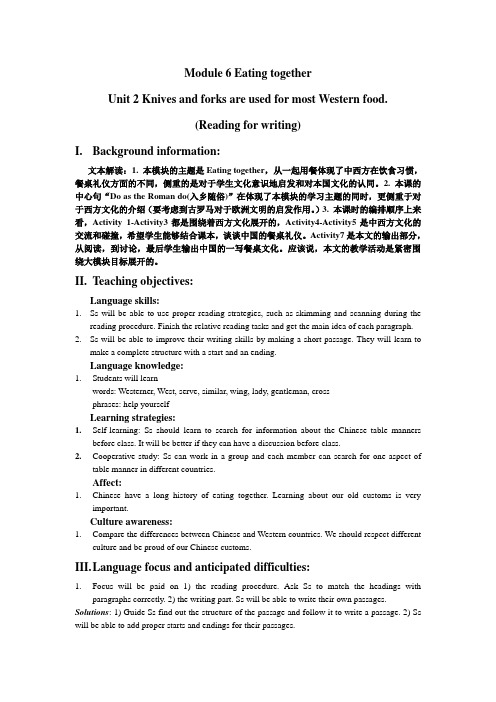
Module 6 Eating togetherUnit 2 Knives and forks are used for most Western food.(Reading for writing)I.Background information:文本解读:1. 本模块的主题是Eating together,从一起用餐体现了中西方在饮食习惯,餐桌礼仪方面的不同,侧重的是对于学生文化意识地启发和对本国文化的认同。
2. 本课的中心句“Do as the Roman do(入乡随俗)”在体现了本模块的学习主题的同时,更侧重于对于西方文化的介绍(要考虑到古罗马对于欧洲文明的启发作用。
)3. 本课时的编排顺序上来看,Activity 1-Activity3都是围绕着西方文化展开的,Activity4-Activity5是中西方文化的交流和碰撞,希望学生能够结合课本,谈谈中国的餐桌礼仪。
Activity7是本文的输出部分,从阅读,到讨论,最后学生输出中国的一写餐桌文化。
应该说,本文的教学活动是紧密围绕大模块目标展开的。
II.Teaching objectives:Language skills:1.Ss will be able to use proper reading strategies, such as skimming and scanning during thereading procedure. Finish the relative reading tasks and get the main idea of each paragraph. 2.Ss will be able to improve their writing skills by making a short passage. They will learn tomake a complete structure with a start and an ending.Language knowledge:1.Students will learnwords: Westerner, West, serve, similar, wing, lady, gentleman, crossphrases: help yourselfLearning strategies:1.Self-learning: Ss should learn to search for information about the Chinese table mannersbefore class. It will be better if they can have a discussion before class.2.Cooperative study: Ss can work in a group and each member can search for one aspect oftable manner in different countries.Affect:1.Chinese have a long history of eating together. Learning about our old customs is veryimportant.Culture awareness:pare the differences between Chinese and Western countries. We should respect differentculture and be proud of our Chinese customs.III.L anguage focus and anticipated difficulties:1.Focus will be paid on 1) the reading procedure. Ask Ss to match the headings withparagraphs correctly. 2) the writing part. Ss will be able to write their own passages. Solutions: 1) Guide Ss find out the structure of the passage and follow it to write a passage. 2) Ss will be able to add proper starts and endings for their passages.2.It’s difficult for Ss to understand the main idea of the passage without backgroundinformation..Solution: encourage Ss to search for information before the class and personal experience is also important.IV.Teaching aids:Blackboard, PPT, some pictures, videoV.Teaching procedures:Warming up:1.Enjoy a video: watch the video “ A trip to Rome”.Answer a question: Where is it? It’s in Rome, Italy.Pre-reading:1.Free talk: Have you ever heard this saying “ When in Rome, do as the Romans do.”? Talkabout its meaning to your partner.2.Look at the photos and discuss.Q: What do you see at a meal in China?A: They use chopsticks. The food is serve d for a group of people.Q: What do you see at a meal in a Western country? (People live in a Western country are Westerner s.)A: They use a knife and fork. the food is served for a person.Conclusion: They are different.(“different” means “not similar”.)3.Discussion: if you are invited to have dinner in a Western family, what rules should youfollow? (list some rules below)1) Arrive on time. 2) Bring a gift. 3) Put the Handkerchief on your legs. 4) Fork is put in yourleft hand and knife is in your right. 5) Cut the steak into pieces quietly. 6) Uesd fork and knife should be put on your plate. 7) Thank the host after dinner. 8) Ladies first !(Gentlemen should do after ladies.)While-reading:1.Fast reading:a.Ask and answer.1)Who is the passage written for? (A: The passage is written for visitors to Westerncountries from another part of the world)2)Where might you see a passage like this? (A: The passage might appear in a magazine,such as an travel magazine.)b.Match the headings with the paragraphs.2.Careful reading:1)Read the passage and complete the table in Activity 3. Find the information from thepassage. (Reading strategy: use the heading of each paragraph properly)2)Read the passage carefully and answer the questions. (pay attention to Ss’ personalexperience in the life when they compare the differences between China and the West.) Post-reading:1.Can you list some Chinese eating customs for the foreign visitors? You can write from theseaspects.Time: In China, lunch is usually served around…./Dinner is served….Greeting: At the start of meal, people often say….Tableware(餐具): People use chopsticks to…/spoons to…/ we sometimes use fingers to…Service(服务): You will be served by yourself/ by someoneEnd of meal: If you have finished, your should …./It’s not polite if you ….2.Give your start and ending for your passage.Start: ___________________________________________________________Ending: _________________________________________________________3.Try to make a short passage by themselves.4.Do you know?There is a theory called “Iceberg theory”. It tells people that people’s behaviors are just a small part that we can see. But the behaviors are decided by their nations, environment and so on. Try to understand each other and respect the different cultures in the world! Homework:You must:1.Finish Exercise Book 1 M6U22.Read the words at least 5 times and passage at least 3 times.3.Finish writing the complete passage.You may:1. Search more information about different customs in different countries.VI.Blackboard design:。
外研版英语九年级下Module6Unit2知识讲解

Unit 2 You should always go with someone.Six rules for a safe and healthy lifeThanks to improvements in both health care and personal safety, most people are living healthier, longer lives. Someone who is born today can expect to live 25 years longer than someone who was born in the 19th century. It’s even thought that in the future more and more people will celebrate their hundredth birthday. Here are six rules for a healthy life.thanks to live a …lifeexpect to do sth.: He expects to get a pay rise.expect sb. to do sth.: They expect me to work on Sunday.be expected to do sth.: I’m expected to work on Sunday.more and more/ fewer and fewer/ less and less1. Be careful! It’s dangerous out there!We all know that we shouldn’t ru n across the road in front of the oncoming traffic, or cycle too close to cars. But we’re not sure about how to stay safe in the countryside. When you’re out walking, you should always go with someone, and tell your parents where you’re planning to go. Remember! Climbing may also mean falling- what goes up must come down. Safety rules and advice are there to help you, not to make life less fun.be(not)sure about+ “疑问词+不定式”be sure+ that 从句be sure of+名词/ 代词be sure to do sth. 一定要做某事I’m sure 可单独使用,多用于口语mean + doing/ to do2. Don’t be a couch potato!Sure, it’s comfortable to sit on the couch and watch. But experts say you should walk at least 10, 000 steps every day to keep fit. In the past, people’s jobs required more physical effort. When farmers were working in the fields, they were keeping fit at the same time. Think about it: do you get the same amount of exercise today as they did in the past?at least: The trip will take 3days at least.at most: The trip will take 3 days at most.keep(stay)fit(healthy)3. Watch your diet!It’s important to eat plenty of the right things, above all, fruit, vegetables, and to see fast food or sweets as something very special- maybe just now and then. The wrong diet means you’ll put on weight, one of the fastest ways to an unhealthy life.see… as:The hotel sees him as a VIP.now and then put on weight gain weight lose weight4. Rest up while you can!When we were babies, we slept for much of the day- if our parents were lucky! Teenagers don’t need as much sleep but it’s important to get about eight hours’ sleep. At weekends, you’ve got more time, so use it not just for your friends, but for rest, too.…as much sleep(省略“as babies”)5. Don’t worry. Be happy!Many doctors believe that happiness is impo rtant for our general health. If you’re worried about something, talk to your parents or your teacher.6. Say no…to s moking and drugs!Yes, you knew I was going to say this! But it’s so important. More teenagers damage their health through smoking and taking drugs than any other dangers. Think about the effect on your family and friends, and think about its effect on you and your health.Happy living!say no/ yes/ hello/ goodbye to + sth.effect on/ upon 对……的影响/作用。
外研版九年级英语下册Module 6 模块知识点归纳

Module 6 Eating togetherWhen is the school-leavers' party?必背单词1.invitation(n.)邀请;请柬→invite(v.)邀请2.paint(v.)绘画→painting(现在分词)3.heat(v.)使变热,给……加热→heat(n.)高温,热度4.knife(n.)餐刀;刀具→knives(pl.)5.Italian(adj.)意大利的;意大利语的;意大利人的;(n.)意大利语;意大利人→Italy(n.)意大利6.calendar(n.)日历;历书7.balloon(n.)气球8.fork(n.)餐叉9.spoon(n.)匙;勺子10.cheeseburger(n.)干酪汉堡包必背短语11.in fact 事实上12.heat up使变热;给……加热13.be made with…由……制成必背句子14.Oh,soup's no good then.噢,那么汤就不适合了。
15.I see what you mean.我明白你的意思。
16.It's becoming popular in China too!在中国它也正变得流行起来!Knives and forks are usedfor most Western food.必背单词1.Westerner(n.)西方人→western(adj.)西方的→West(n.)西方(尤指西欧和北美)2.serve(v.)端上(食物和饮料);服侍……进餐→served(过去式) 3.similar(adj.)相似的→be similar to和……相似4.lady(n.)女士;夫人;小姐→ladies(pl.)5.gentleman(n.)先生;男士→gentlemen(pl.)6.cross(adj.)生气的→angry(同义词)(adj.)生气的7.wing(n.)翅膀;翼必背短语8.know about了解9.at the start of…在……的开始10.be used for…被用作……11.help yourself随便做(或用)吧;请自便12.for example例如13.no one没有人14.at the end of…在……的末尾必背句子15.When in Rome,do as the Romans do.入乡随俗。
外研社九年级下册m6知识点
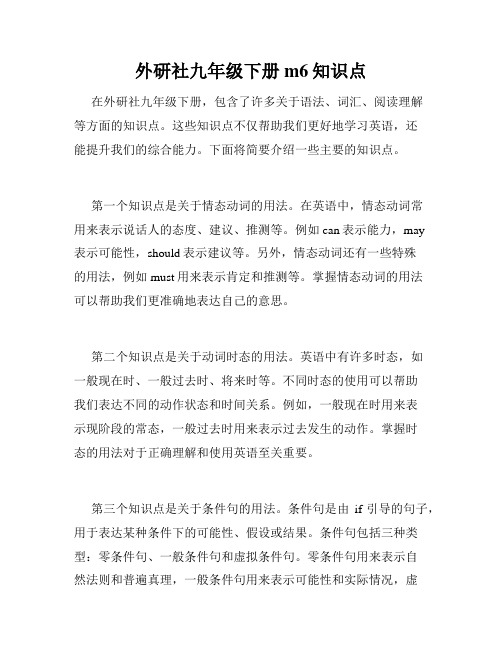
外研社九年级下册m6知识点在外研社九年级下册,包含了许多关于语法、词汇、阅读理解等方面的知识点。
这些知识点不仅帮助我们更好地学习英语,还能提升我们的综合能力。
下面将简要介绍一些主要的知识点。
第一个知识点是关于情态动词的用法。
在英语中,情态动词常用来表示说话人的态度、建议、推测等。
例如can表示能力,may表示可能性,should表示建议等。
另外,情态动词还有一些特殊的用法,例如must用来表示肯定和推测等。
掌握情态动词的用法可以帮助我们更准确地表达自己的意思。
第二个知识点是关于动词时态的用法。
英语中有许多时态,如一般现在时、一般过去时、将来时等。
不同时态的使用可以帮助我们表达不同的动作状态和时间关系。
例如,一般现在时用来表示现阶段的常态,一般过去时用来表示过去发生的动作。
掌握时态的用法对于正确理解和使用英语至关重要。
第三个知识点是关于条件句的用法。
条件句是由if引导的句子,用于表达某种条件下的可能性、假设或结果。
条件句包括三种类型:零条件句、一般条件句和虚拟条件句。
零条件句用来表示自然法则和普遍真理,一般条件句用来表示可能性和实际情况,虚拟条件句用来表示假设和非真实情况。
掌握条件句的用法可以帮助我们更加灵活地表达自己的意思。
第四个知识点是关于时态和语态的一致性。
在英语语法中,时态和语态要保持一致。
即,主语的时态和语态决定了谓语动词的形式。
例如,当主语是第三人称单数时,谓语动词要加上-s,当主语是被动语态时,谓语动词要使用be动词的过去分词形式。
注意时态和语态的一致性可以避免句子的混淆和错误。
第五个知识点是关于词组动词的用法。
英语中有许多词组动词,它们由动词和介词或副词组成,表示一种特定的动作或含义。
例如,look forward to表示期待,give up表示放弃,take off表示起飞等。
词组动词的用法相对固定,需要我们记住它们的具体意义和用法。
通过理解和掌握这些知识点,我们可以更好地学习英语,提高自己的语言能力。
外研版九年级下册Module 6知识点整理

外研版九年级下册Module 6知识点整理Module 6 Problems重点短语1.too much + 不可数名词太多的2.play the guitar 弹吉他2.play musical instruments 演奏乐器4. Stop sb. (from) doing sth.阻止某人做某事5. make a deal with sb. 与某人达成协议6. fail the exam 考试不及格pass the exam 通过考试fail to do sth. 做某事没成功7.anyway 不管怎样8. want sb. to do sth. 想要某人做某事9. get into the habit of (doing) sth. 养成做某事的习惯10. come home from school放学回到家11. do volunteer work 做义工12. That’s / It’s a shame. = That’s / It’s a pity.What a shame/pity. 真可惜;真遗憾13. No deal. 不行。
14. Instead of (doing) sth. 代替/而不是做某事15. That’s not the point. 那不是重点。
16. consider doing sth. 考虑做某事17. last word 最终决定;最后一句话18. ask for one’s advice 征求某人的建议19. come round to sp. 拜访(某地)20. use sth. for (doing) sth. 把某物用于(做)某事21. go wrong 出毛病;出故障22. decide to do sth. 决定做某事23. ry out 试用;试24. take off 起飞;脱下;卸载25. no longer = not ... any longer no more = not …any more 不再26. be angry with sb. 生某人的气be angry at sth. 对某事生气27. get back 找回;要回28. make mistakes 犯错29. tell sb. to do sth. tell sb. not to do sth.30. tell sb. the truth 告诉某人真相= to be honest 说实话31. at least 至少at most 至多32. apologise to sb. for (doing) 因某事向某人道歉=make an apololgy to sb. for (doing) sth.33. pay the bill 付钱;34. offer to do sth. 主动提出做某事35. warn sb. (not) to do sth. 警告某人(不要)做某事36. by mistake 错误地37. hurry up 快点;赶快38. get high marks 取得高分39. Pocket money 零花钱40. refuse to do sth. 拒绝做某事41. save up a lot of money 攒了许多钱42. feel sorry for 为……感到遗憾43. get into trouble with sb. 与某人关系紧张44. warn sb. of /about (doing) sth. 警告某人关于(做)某事用法集萃1. sb. spend some time/money (in) doing sth花费时间、金钱做某事2. want (sb.) to do sth想要(某人)做某事3. stop sb.\sth. (from) doing sth. 阻止某人做某事4. get into the habbit of doing sth. 养成做...的习惯5. It’s +adj.(形容词)+to do sth.做某事是...的6. as +形容词或副词的原形+as 和...一样....7. You should +动词原形你应该做....8. finish doing sth 完成做某事。
外研版九年级下册module6知识点

外研版九年级下册module6知识点Module 6: Protecting the EnvironmentIn the ninth grade, students studying the New Standard English textbook will come across Module 6, which focuses on protecting the environment. This module delves into various aspects of environmentalism and encourages students to take action to preserve our planet. In this article, we will explore some key points from Module 6.1. The Importance of Environmental ProtectionModule 6 emphasizes the significance of environmental protection. Students are introduced to the concept of the Earth as a fragile ecosystem and learn about the detrimental effects of human activities on the environment. By understanding the consequences of pollution, deforestation, and climate change, students develop a sense of responsibility to safeguard the Earth for future generations.2. Climate Change and Global WarmingOne of the main topics addressed in Module 6 is climate change and global warming. Students learn about the causes and consequences of these phenomena. They study the greenhouse effect, CO2 emissions, and the role of human activities in exacerbating the problem. Through discussions and interactive activities, students gain a deeper understanding of the urgency to combat climate change.3. Sustainable Development and Renewable EnergyIn this module, students explore the concept of sustainable development. They learn about the importance of balancing economic growth with environmental conservation. Additionally, the module introduces students to various forms of renewable energy, such as solar power, wind energy, and hydroelectricity. Through group projects and presentations, students are encouraged to brainstorm innovative ideas for incorporating renewable energy solutions in their communities.4. Wildlife Conservation and BiodiversityModule 6 also focuses on wildlife conservation and biodiversity. Students explore the importance of preserving different species and ecosystems. They learn about the threats faced by endangered species and the role of humans in protecting biodiversity. The moduleencourages students to take part in conservation efforts and raises awareness about the significance of ecological balance.5. Recycling and Waste ManagementAnother key topic in Module 6 is recycling and waste management. Students learn about the 3Rs: Reduce, Reuse, and Recycle. They are encouraged to adopt environmentally friendly habits, such as reducing their carbon footprint, composting organic waste, and properly disposing of hazardous materials. Practical activities, such as organizing recycling drives, help students apply their knowledge and contribute to waste reduction.6. Environmental ActivismModule 6 also highlights the role of environmental activists in raising awareness and effecting change. Students are introduced to influential figures, such as Greta Thunberg, who have dedicated their lives to environmental causes. They learn about peaceful protests, campaigns, and the power of collective action. Through group discussions and projects, students are inspired to become advocates for environmental protection.ConclusionModule 6 of the New Standard English textbook provides a comprehensive exploration of environmentalism and the importance of protecting the Earth. Through engaging activities and thought-provoking discussions, students gain a deeper understanding of key environmental issues and are empowered to make a positive change. By instilling these values in the next generation, the module plays a vital role in nurturing environmentally conscious citizens who can contribute to a sustainable future for all.。
外研版九年级下英语各单元要点总结
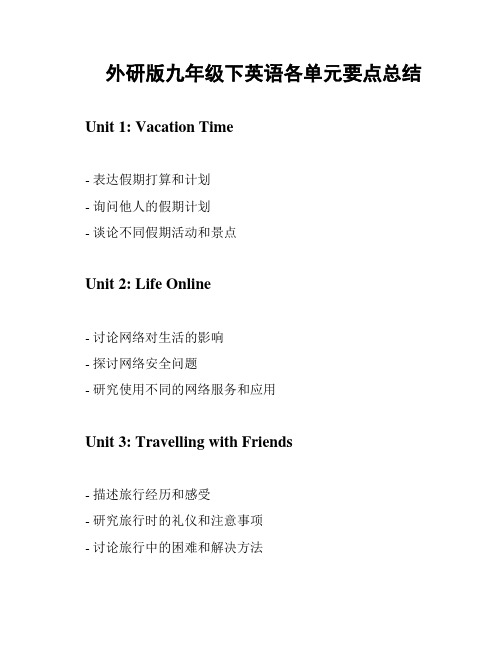
外研版九年级下英语各单元要点总结Unit 1: Vacation Time
- 表达假期打算和计划
- 询问他人的假期计划
- 谈论不同假期活动和景点
Unit 2: Life Online
- 讨论网络对生活的影响
- 探讨网络安全问题
- 研究使用不同的网络服务和应用
Unit 3: Travelling with Friends
- 描述旅行经历和感受
- 研究旅行时的礼仪和注意事项
- 讨论旅行中的困难和解决方法
Unit 4: Discovering the Universe
- 研究关于宇宙的知识
- 讨论宇宙中的现象和事件
- 探索未来的太空探索计划
Unit 5: Great Inventions
- 研究有关重要发明的历史和背景
- 分析发明对社会的影响
- 讨论未来可能的重大发明
Unit 6: Wonderful Wildlife
- 研究有关保护野生动物的知识
- 探讨野生动物及其栖息地的问题
- 了解野生动物保护的重要性
Unit 7: Cultural Heritage
- 研究各种文化遗产和传统俗
- 分析文化遗产对社会的重要性
- 探讨如何保护和传承文化遗产
Unit 8: Healthy Lifestyle
- 介绍保持健康的重要性
- 讨论不同的健康生活方式
- 研究如何保持身体和心理健康
Unit 9: Taking Action
- 研究社会问题和环保行动
- 分析社会问题的原因和解决方法
- 探讨如何积极参与社会行动
以上是外研版九年级下英语各单元的要点总结。
外研版九年级英语下册短语汇总(Module 6)

外研版九年级英语下册短语汇总(Module 6)外研版九年级英语下册短语汇总(module6)module61.haveanaccident出事故20.goup上升3.haveafever发烧have=gethaveaflu流行性感冒haveacold感冒haveabadcold重感冒haveapaininthechest胸口疼inpain痛苦地4.who’smissing?谁不在?/谁不见了?bemissing不见,不在8.catchup赶上,追上catchupwithsb赶上某人,追上某人catchthebus赶公共汽车catchsbbythearm抓住某人的手臂catchsb.抓住某人9.tripover绊倒(往前倒)0.callforhelp打电话求救11.thanksto=becauseof由于,因为thanksbfordoing感谢某人做某事12.第一百个生日thehundredthbirthdaysb’shundredthbirthday某人百岁生日14.expecttodosth期望做某事expectsbtodosth期望某人做某事15.Itisthoughtthat…认为…Itiseventhoughtthat…甚至认为…16.haveaneffectonsb/sth对某人/某事有影响7.theoncomingtraffic迎面而来的车辆18.besureofsth/doingsth相信能做某事besuretodo相信能做某事21.requiresbtodo/that---要求某人做某事requiredoingsth要求做某事22.alargeamountof+不可数名词:大量anumberof+可数名词复数许多23.watchyourdiet注意饮食24.nowandthen偶尔,有时25.not---,but---不是---而是26.fromsidetoside从一边到另一边27.pullsbaway把某人推开pullsbawayfrom…把某人从…推开28.takeasuddeninterestin对---突然感兴趣其中take=have=show29.lookup查阅findout查出,找出,发现30.inotherwords换句话说31.eighthours’sleep8小时的睡眠toomuchsleep太多睡眠33.比较级+thananyother+单数比较级+thanany+单数34.giveintosth屈服于…,让步于…giveupdoingsth/sth放弃做某事/某事35.dieof死于等diefrom死于等dieaway逐渐消失dieout完全灭绝36.fix=mend=repair修理fixmybikenon-smokers非吸烟者38.atleast至少edown下沉40.restup休息,休养41.seesth/sbas把某事/某人看作。
九年级下册英语module6知识点
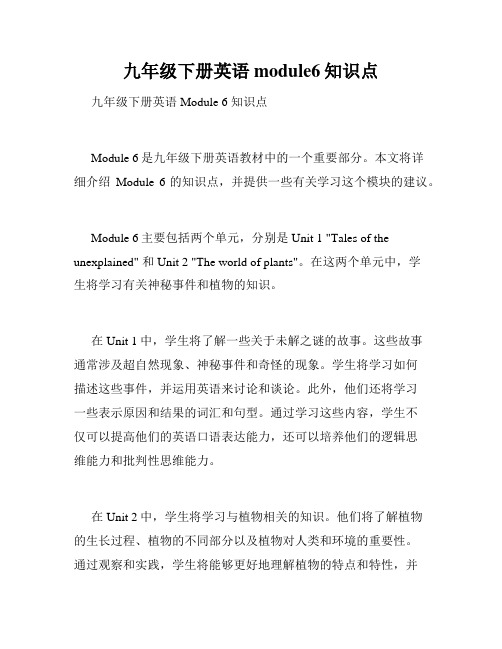
九年级下册英语module6知识点九年级下册英语Module 6 知识点Module 6是九年级下册英语教材中的一个重要部分。
本文将详细介绍Module 6的知识点,并提供一些有关学习这个模块的建议。
Module 6主要包括两个单元,分别是Unit 1 "Tales of the unexplained" 和Unit 2 "The world of plants"。
在这两个单元中,学生将学习有关神秘事件和植物的知识。
在Unit 1中,学生将了解一些关于未解之谜的故事。
这些故事通常涉及超自然现象、神秘事件和奇怪的现象。
学生将学习如何描述这些事件,并运用英语来讨论和谈论。
此外,他们还将学习一些表示原因和结果的词汇和句型。
通过学习这些内容,学生不仅可以提高他们的英语口语表达能力,还可以培养他们的逻辑思维能力和批判性思维能力。
在Unit 2中,学生将学习与植物相关的知识。
他们将了解植物的生长过程、植物的不同部分以及植物对人类和环境的重要性。
通过观察和实践,学生将能够更好地理解植物的特点和特性,并能够自己动手进行植物实验。
此外,学生还将学习一些关于植物的科学词汇和概念,提高他们的科学素养。
为了更好地学习Module 6,学生可以采取以下几点建议:首先,认真阅读教材,并确保理解教材中的每个知识点。
如果有任何不清楚的地方,可以向老师寻求帮助。
其次,多做练习题和习题,并通过与同学的交流来巩固所学知识。
这样可以更好地强化学习效果,提高自己的英语能力。
此外,鼓励学生积极参与课堂活动,并积极主动地与同学和老师进行互动。
参与讨论和团体活动可以帮助学生更好地理解和掌握Module 6中的知识和技能。
最后,考试前,学生可以预习并复习该模块的知识和技能。
通过预习和复习,学生可以更好地掌握重点内容,提高考试成绩。
总之,Module 6是九年级下册英语教材中的一个重要部分。
通过学习这个模块,学生可以提高他们的英语口语能力和科学素养。
外研版英语九年级下册全册各模块知识点归纳总结

九年级下册知识点总结Module1 TravelUnit1 We toured the city by bus and by taxi.1. welcome back 欢迎回来2. not bad 还不错3. be full of 充满=be filled with4. over = more. than 超过、多于5. because of + 名词/ 代词/动名词because +句子6. fly back to +地名飞回某地7. a bit late 有点晚 a bit of + 不可数名词8. fly direct to Hong Kong 直飞香港9. succeed in doing sth. 成功做某事10. take a boat to sp. = go to sp. by boat 坐船去某地have quite a good time 玩得很高兴11. tour the city v. = take a tour to the city n. 环城市旅行12. go for a walk 去散步13. had better do sth. 最好做某事14. at the end of the term 在学期末15. nothing to worry about 没什么担心的16. as long as 只要; 和……一样长17. the school-leavers’ party 毕业生晚会18. look forward to+ sth. / doing sth. 盼望(做)某事Unit 2 It’s a long story.1. say goodbye to sb. 向某人告别say hello to sb. 向某人问候2. take care 多保重care for:喜欢care about:关心take care = be careful 小心、注意take care of sb. / sth. 照顾某人/ 保管某物3. get on 上(车)get off 下(车)4. Be afraid +that从句恐怕be afraid of +名词/代词/动名词害怕/担心be afraid to do sth. 害怕做某事5. take one’s seat 就坐;坐某人的座位have /get sth. ready: 把某物准备好Please have your tickets ready.请把票准备好。
- 1、下载文档前请自行甄别文档内容的完整性,平台不提供额外的编辑、内容补充、找答案等附加服务。
- 2、"仅部分预览"的文档,不可在线预览部分如存在完整性等问题,可反馈申请退款(可完整预览的文档不适用该条件!)。
- 3、如文档侵犯您的权益,请联系客服反馈,我们会尽快为您处理(人工客服工作时间:9:00-18:30)。
Module 6 Eating together
When is the school-leavers' party?
必背单词
1.invitation(n.)邀请;请柬→invite(v.)邀请
2.paint(v.)绘画→painting(现在分词)
3.heat(v.)使变热,给……加热→heat(n.)高温,热度
4.knife(n.)餐刀;刀具→knives(pl.)
5.Italian(adj.)意大利的;意大利语的;意大利人的;(n.)意大利语;
意大利人→Italy(n.)意大利
6.calendar(n.)日历;历书
7.balloon(n.)气球
8.fork(n.)餐叉
9.spoon(n.)匙;勺子
10.cheeseburger(n.)干酪汉堡包
必背短语11.in fact 事实上
12.heat up使变热;给……加热
13.be made with…由……制成
必背句子
14.Oh,soup's no good then.
噢,那么汤就不适合了。
15.I see what you mean.
我明白你的意思。
16.It's becoming popular in China too!
在中国它也正变得流行起来!
Knives and forks are used
for most Western food.
必背单词
1.Westerner(n.)西方人→western(adj.)西方的→West(n.)西方(尤指西欧和北美)
2.serve(v.)端上(食物和饮料);服侍……进餐→served(过去式) 3.similar(adj.)相似的→be similar to和……相似
4.lady(n.)女士;夫人;小姐→ladies(pl.)
5.gentleman(n.)先生;男士→gentlemen(pl.)
6.cross(adj.)生气的→angry(同义词)(adj.)生气的
7.wing(n.)翅膀;翼
必背短语8.know about了解
9.at the start of…在……的开始
10.be used for…被用作……
11.help yourself随便做(或用)吧;请自便12.for example例如
13.no one没有人
14.at the end of…在……的末尾
必背句子
15.When in Rome,do as the Romans do.
入乡随俗。
16.The fork is held in your left hand and the knife in your right.
左手拿叉,右手拿餐刀。
17.Watch the other people.Do as they do.
观察其他人,照他们那样做。
Language in use
必背短语
1.pick up捡起;拿起
2.put on穿上
3.be worried about担心
4.join in加入
必背句子
5.Don't worry that you won't enjoy food without seeing it.
不用担心看不到食物你就不能享受食物。
6.Here's some advice.
这儿有些建议。
7.Email me if you have any other questions.
如果你有其他任何问题,给我发电子邮件。
